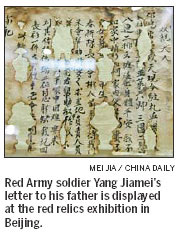History through personal stories
Updated: 2011-07-26 11:17
By Mei jia (China Daily)
|
|||||||||

In 2006, Wang Jinchang, a collector of red (revolution-themed) relics, found two letters written in the early 1930s by Red Army soldiers in Jiangxi province, a base of the Communist Party of China, to their family members.
"I, your son, will definitely smash the enemy's fifth 'Encirclement and Suppression' with my fellow men," Liang Changshun wrote to his mother, while soldier Wang Jinzhu exhorted his older brother to also join the revolution.
Wang says he was moved by what he read and shocked to discover that both these brave men died in the battles associated with the Long March (1934-1936) of the Red Army.
Wang began collecting red relics in the 1980s. They included revolutionary documents, publications and certificates dating from the 1910s to the 1940s.
But he was more interested in the personal accounts of the soldiers.
He has already published two books of diary entries - one of a Beijing resident's record of daily life from 1938 to 1943, and the other of a linguistic expert's account from 1948 to 1999. Both reveal their tribulations set against the backdrop of moments of historical significance.
"The frequently neglected details of daily life are part of the history that has shaped us," Wang says. "My collections complement the bigger picture."
Experts from the Academy of Military Sciences acknowledge Wang's contributions and point to his The Red Classics, a picture book of about 1,000 items he has collected.
Wang's collection includes a diary of Wu Chi-wei, a Kuomingtang officer involved in attacking the Red Army in the 1930s.
Wu's entry of Jan 6, 1936, says: "For food provisions, our army had to compete with the local residents, which caused resentment 'We'd prefer to have the Red Army coming', I was thus told."
And on Jan 23, the same year, he wrote: "When the Red Army was here, they just fought against the local bullies; our army got food and tools by force, and destroyed the woods."
Around 500 items from Wang's collection are now on display at Zhongliang Museum under China Oil and Food Corporation in Beijing. They include an iron Party emblem from the 1930s.
Ning Gaoning, chairman of the corporation, says the displays need no explanation as they are vivid representations of history.
"After the 1911 Revolution, there were plenty of ideas about building the nation," Ning says.
"The exhibition shows how an organization was formed and developed in a certain historical context."